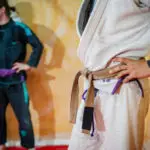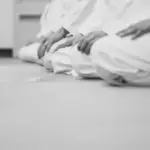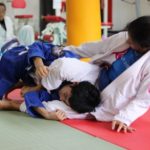Learning any new skill, whether it be a new sport or a new office job, can be challenging. But, over time, you will learn and adapt, and your skills will improve. With something more physical like Brazilian Jiu-Jitsu, different strength and conditioning aspects add to its difficulty.
Brazilian Jiu-Jitsu is difficult to learn for beginners because it is a very different type of martial art. It is also a combat sport, which, if you’re not used to it, will be uncomfortable at first. Over time, as your body becomes more familiar with the movements it will be easier to learn new techniques as there is a lot of crossovers!
When you’re new, you’re also going to be going up against others more experienced than you. They will beat you for a while, which can be frustrating. Brazilian Jiu-Jitsu requires hours of practice before you start understanding how it works and the strategy behind it. It can be rough at first but also very rewarding once you start to find your rhythm.
What Makes Learning Brazilian Jiu-Jitsu Difficult?
Learning Brazilian Jiu-Jitsu is difficult because many of the movements will feel unnatural or unfamiliar to your body. Learning a new technique consists of many small details to perform the technique correctly and learning how to move your body to perform that technique.
Brazilian Jiu-Jitsu is a ground-based martial art where you use a combination of various non-violent techniques to force your opponent into submission. In Japanese, the name actually translates to “gentle art,” but that doesn’t mean it is physically gentle.
Whereas most combat sports involve striking and/or kicking, Brazilian Jiu-Jitsu is an art that emphasizes the use of chokes, grappling, and joint manipulations to get your opponent to quit before you do.
There are so many different aspects to this popular ground-based martial art. If you’ve never done any combat sport, then this is going to be quite a shock to you. Although it’s an excellent place to start because there isn’t any striking, it can still rough you up and takes a lot of commitment to learning.
The following are a few reasons why learning Brazilian Jiu-Jitsu can be challenging to master:
BJJ Takes A Long Time To Master
Starting anything new will be a challenge, but Brazilian Jiu-Jitsu is a whole different language. Since there are endless variations and ways to submit your opponent, the best teacher will be practice and time.
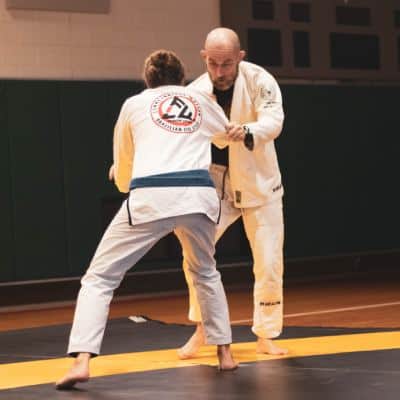
How Long Does It Take to Master Jiu-Jitsu?
In many martial arts, there is a belt system to show rank and experience level. The belts change by color, which shows how you have progressed, and the skill sets you possess.
In Brazilian Jiu-Jitsu, there are a total of 8 belts. In ascending order, they are:
- White: for beginners new to the practice
- Blue: usually acquired over hundreds of hours (1-2 years), the student has shown a broader range of knowledge and application of technical skills
- Purple: experienced enough to start teaching younger and less experienced students
- Brown: those at this level have typically been doing BJJ for about five years and are fine-tuning their skills
- Black: must have spent at least one year as a brown belt; a black belt can be an instructor and is exceptionally proficient in BJJ
- Red/Black (Coral): 7th-degree black belt, usually titled with “master,” and has created an impact on the BJJ community; minimum of 7 years of training and teaching before progressing
- Red/White (Coral): 8th-degree black belt; minimum ten years of teaching and training
- Red: rarely achieved by anyone, this is reserved for those who have perfected the art of BJJ and “whose influence and fame takes them to the pinnacle of art.”
Advancing through the ranks of Brazilian Jiu-Jitsu takes time and consistency. If you’re serious about it, you will have to dedicate hundreds, if not thousands of hours, depending on the rank you wish to achieve.
You Learn The Sport With More Experienced People
When you first start Jiu-Jitsu, you spar to learn and fine-tune your skills and techniques. But when you’re a beginner white belt, you’re sparring with people that are far more experienced than you and could, in all reality, seriously injure you and possibly set you back in your BJJ journey.
There is an immense amount of trust that goes into the sport as well, and of course, the better the gym, the safer everyone will be.
Is BJJ Harder If You Don’t Have Experience With Similar Sports?
Brazilian Jiu-Jitsu combines other techniques like wrestling and judo, so someone who has done some wrestling at the minimum has an advantage when first starting in Jiu-Jitsu. It’s like someone learning to snowboard after knowing how to skateboard and/or wakeboard.
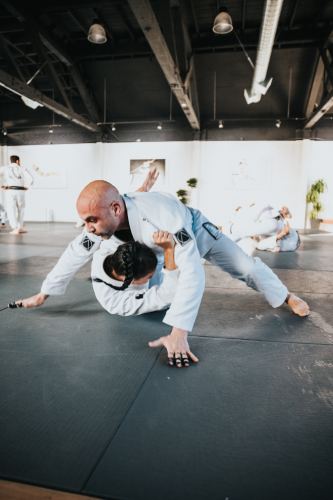
Having learned some of these pre-requisite skills with strong similarities with Jiu-Jitsu can significantly expedite the speed of one’s learning curve with BJJ.
Skills You Need to Learn For Brazilian Jiu-Jitsu
Since you can’t just beat your opponent to a pulp, BJJ has also been referred to as a type of physical chess match. There is a lot of on-they-fly strategy and adjustments, making it not just a physically demanding sport, but mentally as well.
The most critical elements and skills you’ll need to learn to be successful in BJJ:
- Takedowns, which involve wrestling and judo
- Guarding and fighting from your back, and transitions out
- Proper pressure applied when you’re on top
- Good posture
- Proper timing and leverage
- Explosiveness
Since there is a lot of joint and limb manipulation, it is also wise to understand anatomy and how the body is supposed to—and not supposed to—move. Having good flexibility along with joint mobility will be advantageous throughout your Brazilian Jiu-Jitsu journey.
Tips to Easily Improve Your Brazilian Jiu-Jitsu Skills
Although it seems like a mountain to climb, there are ways to break down Jiu-Jitsu’s practice to help in your daily classes and sparring sessions. Pay attention, apply the techniques and habits the instructor and more advanced students teach you and keep showing up.
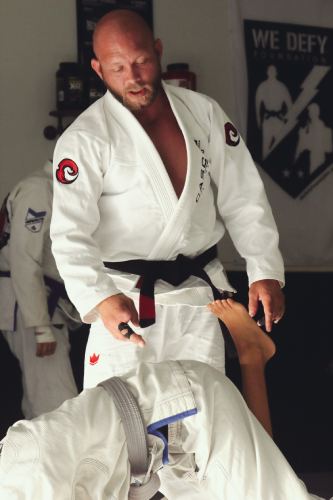
A few tips to help improve your skills with greater ease but also make BJJ enjoyable along the way:
- Even if you’re athletic, don’t think you’ll be dominant on the mats.
- As a beginning white belt, focus on your defensive tactics more than offensive.
- If you’re sore or tired and don’t want to roll as hard, voice that to your rolling partner. If you don’t, you’re more susceptible to injury.
- When you’re forced to submit, think about how you got put in that position and correct from there.
- Ask questions to the instructors and more advanced students.
- Practice and apply the skills from class into your sparring sessions.
Be humble with your Brazilian Jiu-Jitsu journey. No one started out as a black belt, and everyone has been submitted. Ask questions, learn, and apply those things as quickly as you can. Everyone is there to get better, so leave your ego at the door.
Conclusion
Brazilian Jiu-Jitsu is difficult to learn, but it is extremely rewarding. It can teach you a lot more than just how to fight on the ground. It’s a discipline to help teach and learn how to defend yourself and take the offensive if/when striking is not an option.
Brazilian Jiu-Jitsu offers a level of discipline and humility that very few other types of sports and practices can offer. With time and consistency, you will progress over time and be able to handle and control your body in a way you’ve not thought possible before.
If you’re intrigued by the practice and want to challenge yourself in a way you’ve never done before, think no more and start your Jiu-Jitsu journey.
